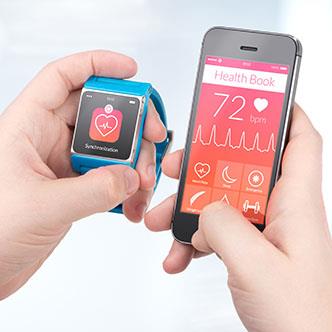
A new app could be useful for millions of people living with atrial fibrillation, based on a recent study that tested the accuracy of a wristband used to detect an irregular heart rhythm.
Presented at the American College of Cardiology’s 67th Annual Scientific Session, this study tested the Kardia Band, which attaches to a smartwatch and can be used to identify an abnormal heart rhythm. With the push of a button, the band records the heart’s electrical activity and links with an app to tell users if their heart rhythm is normal or not.
The technology was designed for patients with atrial fibrillation, a common condition that causes an abnormal heart rhythm. Atrial fibrillation, often called AFib, affects as many as 6.1 million Americans and is associated with increased risk for stroke and other serious complications.
Conducted at the Cleveland Clinic, the recent study included 100 patients with AFib interested in electrical cardioversion. Electrical cardioversion is a treatment that uses an electric shock to restore normal heart rhythm. While cardioversion can be used in emergency situations, many patients elect for the procedure when they think they’re having episodes of AFib.
During their visit, participants used the wristwatch app to track their heart rhythm, and then underwent a standard ECG (electrocardiogram), which is the gold standard for detecting abnormal heart rhythms. If patients were having an episode of AFib, participants then underwent cardioversion and repeated both tests after treatment.
After each visit, researchers used results to compare the accuracy of the smartwatch app versus standard ECG.
In one-third of cases, the smartwatch was unable to get an accurate reading of heart rhythm. However, in the remaining cases, the app correctly identified 93% of abnormal heart rhythms. When results were interpreted by trained professionals, experts were able to detect 99% of abnormal heart rhythms.
"Out of the box, the smartwatch band and its algorithm were very good at identifying AFib," explains Joseph Bumgarner, MD, an electrophysiology fellow at Cleveland Clinic and the lead author of the study. "But when coupled with a physician’s interpretation of the recording [as it should be used], it became even more clinically useful," Bumgarner said.
The technology could help reduce the number of unnecessary AFib procedures, saving both time and money, according to authors.
"There were a significant number of patients—about 8 percent—who on the day of their procedure were found to have a normal heart rhythm [as determined by the watch and validated by the ECG] and did not require a procedure," Bumgarner said. "In the future this technology may help screen patients prior to presentation for elective procedures and avoid scheduling ones that are unnecessary."
This is the first study of its kind to compare the accuracy of a smartwatch device with an ECG, according to authors. Such technology has the potential to impact millions of lives in the United States alone.
“The prevalence of AFib continues to rise, and many people with AFib choose to undergo cardioversion at some point to restore a normal heart rhythm, and so this technology could have wider applicability in the future,” Bumgarner said.